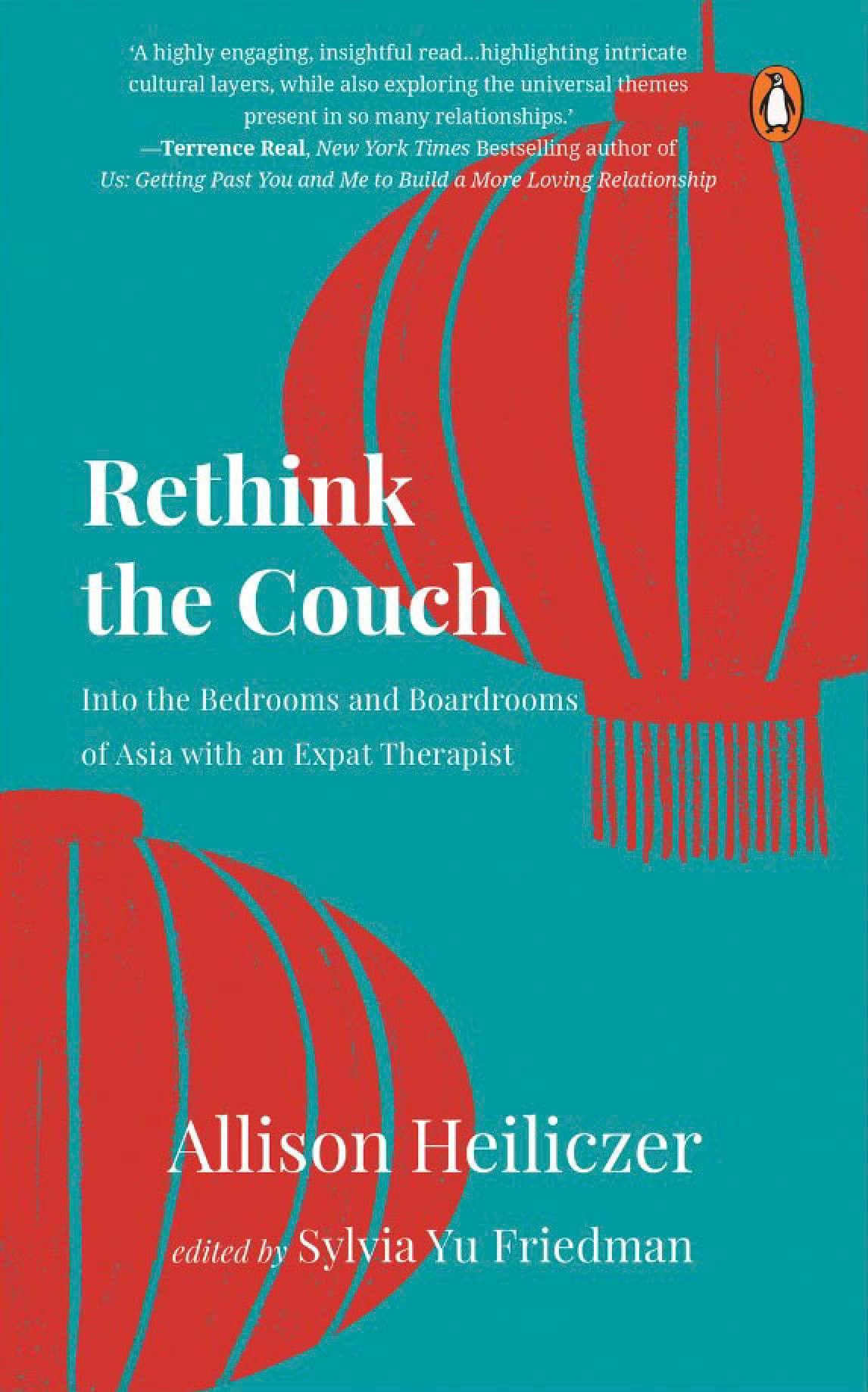But the real joy of the book is getting an insight into how other people tick, and watching Heiliczer nudge her clients towards personal insights and growth.

As you would expect of any therapist worth her salt, Heiliczer doesn’t judge. She comes with compassion, curiosity and a respect for culture, which all adds up to some fascinating work on couples and a remarkable book.
Author leans into Asia, relationship counselling

Heiliczer tells the Post that when she was in graduate school in New York, doing a master’s in counselling, she already knew she wanted to practise as a therapist on the other side of the world – in Asia.
“It’s a dime a dozen in New York City to be a therapist. My commitment was to be in Asia and get a different perspective,” says Heiliczer.
Cut to 2018. She is living in Hong Kong, has completed her master’s in counselling in Hong Kong with Monash University in Melbourne, Australia, done pro bono work for refugees and domestic helpers, and is a psychotherapist at a medical clinic doing a lot of couples work.
In 2022 she became the first certified Relational Life Therapist (RLT) in Asia.

RLT is a form of couples counselling developed by psychotherapist Terrence Real that aims to help partners improve communication, resolve conflicts, develop personal accountability and foster intimacy in the relationship.
“RLT highlights the importance of relational empowerment vs personal empowerment,” says Heiliczer.
“In Asia, there is some resonance with the key points of RLT. It’s a fairly direct form of therapy. The fact that it’s focused more on relational empowerment makes it appealing to couples in Asia.”
Through her work with couples in Asia, she has made some adaptations to RLT to better suit the environment.
For example, Real introduces the notion of “misery stabilisers”. These are the behaviours someone exhibits or the activities they do to help avoid, deny, distract from and move away from pain within themselves and their relationships. Instead, Heiliczer refers to “collective misery stabilisers”.

“These are things that people do collectively, whether it’s drinking together or going on a business trip and the boss is doling out prostitutes. It is about collective participation. These are systems of cooperation.
“When a man goes to a Wan Chai bar with his colleagues, the group is doing it, so it feels socially sanctioned,” Heiliczer says.
Infidelity a common theme
Rethink the Couch reflects her caseload and the stories are all true, although, as she says at the beginning of the book, she has disguised the details of her clients to ensure confidentiality.
Hong Kong’s high divorce, remarriage levels reveal changing attitudes to family
Hong Kong’s high divorce, remarriage levels reveal changing attitudes to family
Private therapy in Hong Kong and Singapore is expensive, so her client base is one with means. But just because these are the trials and tribulations of wealthy folk, that’s not to say that money is not an issue.
“They may be overleveraged and on the 2am anxiety train,” says Heiliczer.
The 2am anxiety train comes up a few times in the book. “2am is the unfavourable hour the betrayed of the world know well, also the hour the anxious of the world know well,” she writes.
From coach to psychiatrist – how to find the right therapist for you
From coach to psychiatrist – how to find the right therapist for you
The other issue that comes up a lot is infidelity. “The book is wallpapered in the affairs,” she says.
Why do people cheat?
Heiliczer believes the reasons can be boiled down to:
-
narcissistic or other personality challenges, such as lack of empathy;
-
unclear value system – either having undefined values or making choices that don’t reflect those values;
-
victim mentality and/or entitlement;
-
porous boundaries, feeling an attraction and not taking steps to remove oneself from interaction;
-
impulsive behaviour, often because of substance use;
-
an unwillingness to reduce risk; and
-
being surrounded by others who are cheating.

Heiliczer is especially interested in understanding the different cultural mandates behind the affairs.
He grew up knowing that his father had a mistress and his grandfather had concubines, so he could, too, as long as he kept it discreet.

Negotiations key to compromise
This is explored in the chapter cheekily titled “Gonorrhoea Tests Don’t Lie”. British Billy, who gives his Chinese fiancée Stephy a sexually transmitted disease, struggles with the notion of giving an allowance to her parents.
“If an allowance is culturally ingrained from a young age, you do it because you have the expectation that when you have a job you will give some to your parents. But if it’s not part of your culture, it can be a difficult concept for people to wrap their heads around. That’s a very difficult negotiation,” says Heiliczer.
I have such a deep curiosity for this part of the world and reverence for … the deep commitment to values like saving face, family, hard work and filial piety
Negotiations are the heartfelt crux of the book and it is fascinating to watch Heiliczer skilfully tease out the unspoken assumptions between couples and help find common ground.
In the case of Billy and Stephy, they were able to have honest and direct conversations to navigate the cultural clashes.
Being a trailing spouse is tough: how to turn it into opportunity
Being a trailing spouse is tough: how to turn it into opportunity
“Negotiation is part of every relationship. It’s one of the most underused skills in couples’ therapy,” says Heiliczer.
Everything is up for negotiation in Rethink the Couch.
In the chapter titled “The Truth is a Kaleidoscope”, Ben and Tricia, an American couple in their early 30s, move to Hong Kong. We meet them in the therapy room eight years into their time in Hong Kong.
Trish, as the “trailing spouse”, struggled to find her place once the thrill of discovering the “exotic” East had worn off. One of them has an affair – not Ben – and the relationship flounders.
“One of the difficult things with the trailing spouse is that there is often an asymmetry in the experiences. For some people, they’ll say, ‘I don’t care if Hong Kong is this or that, as long as I make money’. For other people, it deeply resonates,” says Heiliczer.
She advises couples to take an honest view of their relationship pre-expat posting and discuss things openly. How long do you plan to stay in Hong Kong? What is the backup plan if one partner isn’t happy?
Making a big life decision? Stay calm and be positive, experts say
Making a big life decision? Stay calm and be positive, experts say
Direct questions like this before the big move will minimise unspoken assumptions that may be well off the mark, and keep Hong Kong from becoming the graveyard for the marriage.
Rethink the Couch is culturally illuminating and a romp of a read. You may even find something in there that resonates.
“The understanding of what a marriage is is absolutely culturally dependent.”

